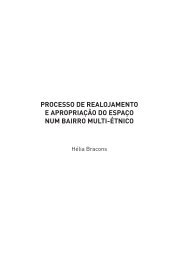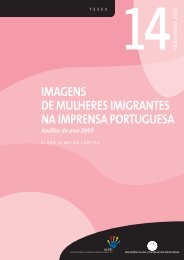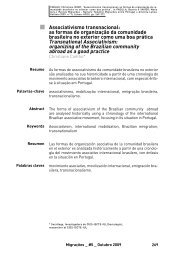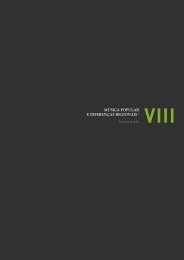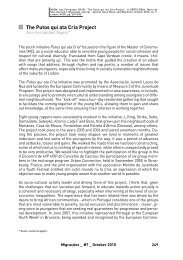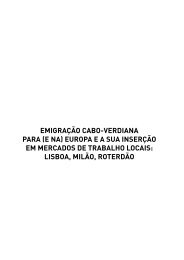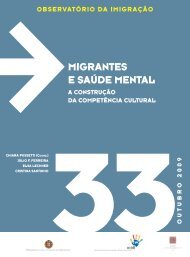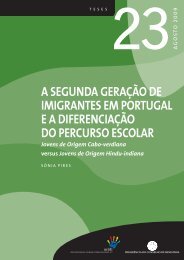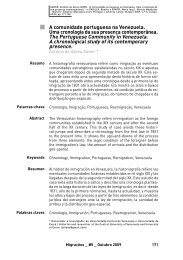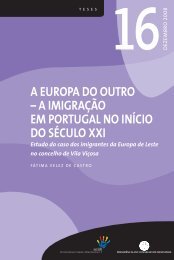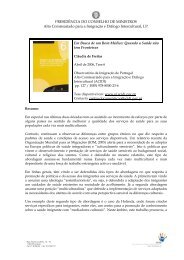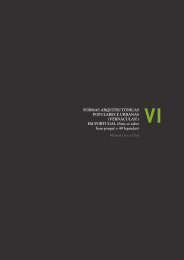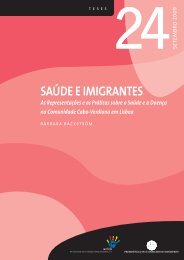Revising citizenship: migration and fado in the play of identities in ...
Revising citizenship: migration and fado in the play of identities in ...
Revising citizenship: migration and fado in the play of identities in ...
You also want an ePaper? Increase the reach of your titles
YUMPU automatically turns print PDFs into web optimized ePapers that Google loves.
7Where <strong>in</strong>formants appear <strong>in</strong> <strong>the</strong> text, for <strong>the</strong>ir privacy, I have changed <strong>the</strong>ir names.8All translations <strong>in</strong>to English are my own.9Luso Americano is a newspaper edited <strong>in</strong> Newark s<strong>in</strong>ce 1928. Be<strong>in</strong>g <strong>the</strong> most read Portuguese newspaper <strong>in</strong> <strong>the</strong>US, it has been edited twice a week s<strong>in</strong>ce 1988, available at http://www.lusoamericano.com/default.aspx, accessedon 20.05.2010.10O<strong>the</strong>r members with<strong>in</strong> <strong>the</strong> community explicitly adhered to o<strong>the</strong>r music cultures. That <strong>of</strong> ranchos folclóricos,studied by Soeiro de Carvalho (1990), is an example <strong>of</strong> it. Some <strong>fado</strong> <strong>in</strong>formants also regretted <strong>the</strong> distance <strong>of</strong> youngsterswho preferred pop music.11“É um povo paradoxal e difícil de governar. Os seus defeitos podem ser as suas virtudes e as suas virtudes os seusdefeitos, conforme a égide do momento” (1971: 33 cited by Cabral, 2003: 524).12Documents <strong>in</strong> <strong>the</strong> Archive <strong>of</strong> <strong>the</strong> SNI/SEIT, Pendão; consulted <strong>in</strong> April 1994, Côrte-Real, 2000:407.13From <strong>the</strong> Constitution <strong>of</strong> <strong>the</strong> Portuguese Republic, available at http://app.parlamento.pt/site_antigo/<strong>in</strong>gles/cons_leg/Constitution_VII_revisao_def<strong>in</strong>itive.pdf,accessed on 27/05/10.1. Everyone shall possess <strong>the</strong> right to education <strong>and</strong> culture.2. The state shall promote <strong>the</strong> democratization <strong>of</strong> education <strong>and</strong> <strong>the</strong> o<strong>the</strong>r conditions needed for an educationconducted at school <strong>and</strong> via o<strong>the</strong>r means <strong>of</strong> tra<strong>in</strong><strong>in</strong>g to contribute to equal opportunities, <strong>the</strong> overcom<strong>in</strong>g <strong>of</strong>economic, social <strong>and</strong> cultural <strong>in</strong>equalities, <strong>the</strong> development <strong>of</strong> <strong>the</strong> personality <strong>and</strong> <strong>the</strong> spirit <strong>of</strong> tolerance, mutualunderst<strong>and</strong><strong>in</strong>g, solidarity <strong>and</strong> responsibility, to social progress <strong>and</strong> to democratic participation <strong>in</strong> public life.3. Act<strong>in</strong>g <strong>in</strong> cooperation with <strong>the</strong> media, cultural associations <strong>and</strong> foundations, cultural <strong>and</strong> recreational groups,cultural heritage associations, residents’ associations <strong>and</strong> o<strong>the</strong>r cultural agents, <strong>the</strong> state shall promote <strong>the</strong> democratization<strong>of</strong> culture by encourag<strong>in</strong>g <strong>and</strong> ensur<strong>in</strong>g access by all citizens to cultural enjoyment <strong>and</strong> creation.4. The state shall stimulate <strong>and</strong> support scientific research <strong>and</strong> creation <strong>and</strong> technological <strong>in</strong>novation, <strong>in</strong> such away as to ensure <strong>the</strong>ir freedom <strong>and</strong> autonomy, re<strong>in</strong>force competetivity <strong>and</strong> ensure cooperation between scientific<strong>in</strong>stitutions <strong>and</strong> bus<strong>in</strong>esses.14Patria, <strong>the</strong> Lat<strong>in</strong> concept for country <strong>of</strong> orig<strong>in</strong>, mean<strong>in</strong>g <strong>the</strong> fa<strong>the</strong>rl<strong>and</strong>, was used abundantly <strong>in</strong> Salazar’s dictatorialspeeches <strong>and</strong> writ<strong>in</strong>gs. Stress<strong>in</strong>g its moral <strong>and</strong> authoritarian significance, it was l<strong>in</strong>ked to government action,always for <strong>the</strong> national good, to which every citizen would uncritically obey. An illustration <strong>of</strong> this procedure can beobserved <strong>in</strong> <strong>the</strong> end<strong>in</strong>g form <strong>of</strong> every <strong>of</strong>ficial letter: “For <strong>the</strong> National Good” (A Bem da Nação).15- La douceur d’une existence tranquille…J’ai répété ces mots avec mélancolie. Je pense aux fleurs, aux fonta<strong>in</strong>es et aux passants paisibles de Lisbonne. Jeme souviens des nuits où les homes silencieux viennent s’asseoir à une miradouro pour regarder les lumières dela ville, t<strong>and</strong>is que les <strong>fado</strong>s se répondent de ruelles en ruelles. Au Portugal, le people trouve encore le temps des’émouvoir et garde le gout du rêve. (…)- L’expérience nous enseigne, poursuit-il, qu’une activité plus <strong>in</strong>tense, les progrès techniques, les réformes socialesles plus pr<strong>of</strong>ondes laissent <strong>in</strong>tactes les qualités de notre people, si par de so<strong>in</strong>s attentifs nous savons ma<strong>in</strong>tenirles coeurs purs et sa<strong>in</strong>es les pensés. C’est pourquoi nous mettons l’esprit au-dessus de tout.L’esprit? Voici peut-être le mot clef. Celui qui déf<strong>in</strong>it le mieux la politique de Salazar. Pour lui, en quelque doma<strong>in</strong>eque ce soit, tout est projection de l’esprit. Il pense que l’esprit façonne et transforme les homes plus pr<strong>of</strong>ondémentque ne le peut la force des dom<strong>in</strong>ateurs. N’a-t-il pas même dit, une fois, que la paix est surtout oeuvre de l’esprit?- Cette condition posée, dit Salazar, nous poursuivons le plus rapidement possible notre oeuvre de reconstructionnationale (Garnier, 1952: 233-34).16For an analysis <strong>of</strong> this perspective see Côrte-Real (1996:141-71).17A song/dance category <strong>of</strong> <strong>the</strong> folklore doma<strong>in</strong>, l<strong>in</strong>ked with rural works.18A song/dance category <strong>of</strong> <strong>the</strong> folklore doma<strong>in</strong>, l<strong>in</strong>ked with a choreographic detail.19Although <strong>the</strong> notions <strong>of</strong> nation, state <strong>and</strong> country may be considered synonyms to denom<strong>in</strong>ate a particular territorywith its own government, due to <strong>the</strong> nationalist dictatorial policies that governed European countries <strong>and</strong>Portugal <strong>in</strong> particular dur<strong>in</strong>g <strong>the</strong> 20 th century, <strong>the</strong> term ‘nation’ appears <strong>in</strong> this article especially connected withthat ideological load.20My translation from Dicionário Priberam da Língua Portuguesa, available at: http://www.priberam.pt/dlpo/, accessedon 15.04.2010.21From ancient Greek times women were not considered citizens due to <strong>the</strong>ir belong<strong>in</strong>g to <strong>the</strong> oikos space (<strong>the</strong>household) ra<strong>the</strong>r than to <strong>the</strong> polis space (<strong>the</strong> city-state).22It is important to note that liv<strong>in</strong>g practice <strong>and</strong> written <strong>the</strong>ory, <strong>in</strong> <strong>the</strong> case <strong>of</strong> Portuguese <strong>citizenship</strong>, as <strong>in</strong> o<strong>the</strong>rs,are different <strong>in</strong>stances <strong>and</strong> that <strong>in</strong>dividual identity feel<strong>in</strong>gs <strong>and</strong> constructs are not registered <strong>in</strong> <strong>the</strong> laws <strong>of</strong> <strong>the</strong>countries. With <strong>the</strong> advent <strong>of</strong> democracy, <strong>the</strong> new Portuguese Nationality Law, Lei n.º 37/81 de 3 de Outubro – Lei daNacionalidade, available at: http://www.cidadevirtual.pt/cpr/asilo1/37_81.html, (accessed on 27.05.2010), tendsto privilege jus sangu<strong>in</strong>i, whereas <strong>the</strong> former, from 1959, tended to privilege jus soli. Some fur<strong>the</strong>r changes havealso been <strong>in</strong>troduced, <strong>the</strong> most recent <strong>in</strong> 2006. Changes to <strong>the</strong> Law <strong>of</strong> Nationality, Lei Orgânica n.º 2/2006, de 17de Abril, cont<strong>in</strong>ue to privilege jus sangu<strong>in</strong>i, available at: http://www.pgdlisboa.pt/pgdl/leis/lei_mostra_articulado.php?nid=735&tabela=leis&nversao (accessed on 27.05.2010).23European Convention on Nationality, Strasbourg 06/11/97, available at: http://conventions.coe.<strong>in</strong>t/Treaty/en/Treaties/Html/166.htm,accessed on 27.05.2010.24“The Portuguese express some <strong>of</strong> <strong>the</strong> highest support for equal social rights for migrants (69.3%) <strong>and</strong> for <strong>the</strong> rightto family reunion (72.2%). 45.2% believe that migrants should be able to become Portuguese citizens easily. Six <strong>in</strong>ten Portuguese th<strong>in</strong>k diversity to be an enrichment, although a significant one <strong>in</strong> ten do not know. 32.2% did notknow that ethnic discrim<strong>in</strong>ation <strong>in</strong> <strong>the</strong> labour market is illegal. Only 37.8% believe that Portugal is not do<strong>in</strong>g enoughMigrações _ #7 _ October 201093



